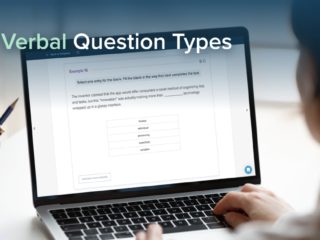| Getting your Trinity Audio player ready... |
Last Updated on April 21, 2023
If you’re like most students who are just getting started studying for the GRE®, you’re investing your time and energy in mastering the content that the GRE® tests. Whether that material be number properties, linear and quadratic equations, roots and exponents, or probability, you’re learning the fundamental concepts that you must understand in order to earn a good GRE score. In other words, you’re building conceptual knowledge.
Those who regularly read my articles know how important it is to build this conceptual knowledge. After all, if you don’t acquire the basic knowledge and skills that are tested, how can you expect to perform well?
If you don’t acquire the basic knowledge and skills that are tested, how can you expect to perform well?
Although building conceptual knowledge is very necessary, it’s not always enough to ensure a good score. In fact, on a regular basis, I encounter test-takers who appear to know their basic GRE® material very well, yet still earn low GRE® scores. Although there are many possible reasons for these low scores, in this article, I’ll discuss one important possibility that is pervasive but is easy to fix: The student, despite having strong conceptual knowledge, lacks procedural and operational knowledge.There are, it seems to me, three important phases of development, or evolutions, that almost all GRE® takers should follow.
There are, it seems to me, three important phases of development, or evolutions, that almost all people taking the GRE® should follow.
Evolution One: Building Conceptual Knowledge
Evolution Two: Developing Procedural Knowledge
Evolution Three: Turning Conceptual and Procedural Knowledge into Operational Knowledge.During the first evolution, a student must build conceptual knowledge, the mandatory foundation of her development. In this conceptual knowledge phase, the student spends her time mastering the content and skills necessary to perform well. For example, she might master the concepts of remainder patterns, the difference between a permutation and a combination, least common multiple and greatest common factor word problems, the difference of squares, factorials, and right triangle geometry. In this evolution, her sole focus is on mastering the content.
She then progresses to evolution two, during which she must build procedural knowledge. Procedural knowledge is the ability to use already learned concepts and skills to solve new problems. In other words, when she gains procedural knowledge, she gains the ability to apply what she has learned to realistic GRE® practice questions. This phase is all about practice, practice, practice, as the student painstakingly turns conceptual knowledge into procedural knowledge. The more problems she solves, the stronger both her conceptual and her procedural knowledge.
By building procedural knowledge, she’s bypassing an age-old flaw in the way that students often study for math. Too many students look at a problem and tell themselves that they can solve it, and then don’t follow through and actually do the work because they recognize the concepts involved in solving it. Come test day, they discover that the problem is not that easy to solve, after all. I see this happening with GRE® students time and again. A useful analogy can be found in running. Imagine having a good deal of knowledge about running that you acquired by extensive reading: everything from biomechanics and kinesiology to running shoes, recovery supplements and pacing strategies. Now, imagine getting up tomorrow morning and going out for a brisk 14-mile run without ever having worked your way up through shorter runs. How’s that 14-miler going to feel?
Back to the GRE®… By solving many GRE® questions, and thus by turning conceptual knowledge into procedural knowledge, you’re helping to ensure that you’re proficient in problem solving. How many of you have had the feeling that you knew you could solve the problem with just a little nudge in the right direction, or just a little more time, or just a slight clarification in the wording? If you’ve experienced these feelings before, you likely had reasonably strong conceptual knowledge but relatively weak procedural knowledge.
In evolution three, the student builds operational knowledge. Operational knowledge is the ability to use conceptual and procedural knowledge in an actual high-stakes situation such as the GRE®. In this final phrase of training, the student makes her final preparations to battle the test.
During this evolution, the student takes many GRE® practice tests under realistic conditions. She notes her feelings, emotions, timing, strengths, and weaknesses while taking the tests. With each subsequent test, her goal is to improve some or all of the flaws she discovered in taking prior tests.
Evolution three is crucial because it allows our brains to prepare for the fight. Just as we had to train our brains to learn the concepts and to learn the procedures, we must also train our brains to perform well under test-day conditions. That is, evolution three prepares us for the real deal, and make no mistake about it, there is a significant difference between the real deal and the practice leading up to it. Think about how boxers prepare. After they have learned the skills and techniques that all boxers must know (conceptual knowledge) and after they have put this knowledge to use by actually training (procedural knowledge), they must begin a sparring regimen, during which they actually get in the ring and fight other boxers. During this phase of training, they are preparing their bodies and minds for the big event. The GRE® isn’t much different…
There is a significant difference between the real deal and the practice leading up to it.
GRE® students often go astray because they don’t devote enough time to evolution three – they don’t build operational knowledge. I often see students who know the GRE® material really well and who have properly practiced with many GRE® problems, but they end up with an actual GRE® scores that are much lower than the range of scores their abilities would indicate. When working with these test-takers to help them increase their scores, I ensure that they spend a proper amount of time in evolution three; I ensure that they build their operational knowledge. Once these students build their operational knowledge, their test scores tend to rise significantly.
In summary, there are three key phases of GRE® preparation:
Building Conceptual Knowledge
Developing Procedural Knowledge
Turning Conceptual and Procedural Knowledge into Operational Knowledge.
To set up a strategic GRE® study plan that allows for the systematic construction of conceptual, procedural, and operational knowledge, divide the number of months you plan to study for the GRE® by three. During the first third spend 75% of your time building conceptual knowledge and 25% building procedural knowledge. During the second third, spend 75% of your time building more procedural knowledge and 25% building operational knowledge. During the final third, spend 50% of your time building operational knowledge and 50% building conceptual and procedural knowledge. Your goal is to (1) know and understand all of the material tested, (2) be able to readily apply your knowledge to realistic practice GRE® questions, (3) be cool, calm, and confident come test day because you know your stuff, you can apply your stuff, and you’ve taken enough practice tests to make test day a day just like any other. Take this methodical approach to your GRE prep and watch your score on the GRE rise.



